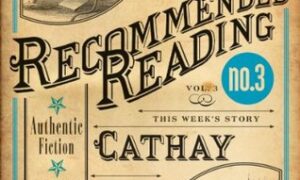 No One Is Coming to Save Us by Stephanie Powell Watts
No One Is Coming to Save Us by Stephanie Powell Watts
My rating: 3/5 cats



We believe despite all experience to the contrary in easy money and our own fortunes changing in an instant like the magician’s card from the sleeve. If one quarter came miraculously from behind the ear, we would milk that ear for days for the rent money. We believe…We are full of the fevered hope of the newly come to Jesus. We can reinvent. We can survive. At least some of us think so. What choice do we have?
when this book was first offered to me and i read the beginning part of the synopsis:
The Great Gatsby brilliantly recast in the contemporary South: a powerful first novel about an extended African-American family and their colliding visions of the American Dream
i was like ‘jay-z gatsby? sign me up NOW!’

i love gatsby, but it’s certainly not the most ethnically diverse book ever, and i was looking forward to gatsby’s themes filtered through a different perspective – something more modern, with a different idea of what constitutes the american dream. i was expecting something like maryse condé’s Windward Heights or caryl phillips‘ The Lost Child, both of which used Wuthering Heights as a springboard to focus on the character of heathcliff and breathe new life into a classic novel by exploring ideas of race, culture, and social issues.
or, heel, even something like the wiz, which took a movie i found trite and insipid, gave it better music, and made it way more fun.
for the record, this is not a fun remake of gatsby:

and for the record, THIS is not really gatsby recast.
it’s only similar if you distill gatsby to:
1) hometown boy makes fortune, returns to woo girl.
2) people have difficulties managing expectations vs. opportunities
it doesn’t have the same brittle, shallow energy of gatsby, and daisy/ava’s sole preoccupation is with getting pregnant, which is pretty much the last thing i expected from a daisy.
this is the part where i make it emphatically clear that i read this as an ARC, and while it appeared to be an ARC that had been through the editorial wringer a few times – i.e., a “finished” ARC with a proper cover and publishing details and not a bound manuscript or anything, it was kind of a mess inside: typos, words or synonyms of words repeated, as though a change had been made without removing the original word, dropped sentences, incorrect character names mid-dialogue, floating quotation marks… which might all seem like minor, cosmetic flaws, but it was distracting and it made me wonder if there were more “meaningful” changes still to be made to the text between now and the pub date, which would alter the reading experience.
because while there is so much that is good here, it’s a little sluggish and it could use some tightening. it’s really close to being really good, but there’s something missing from it that is holding it back from greatness, apart from a stronger connection to gatsby – if that was the author’s true intention and not just some hook imposed upon it by a well-meaning publicist.
because labeling something as “gatsby, recast” inevitably comes with a certain set of expectations, even if you’re a reader who doesn’t mind when adaptations take some liberties with their source material. which i generally don’t. but it’s so hard to see any similarities to gatsby in this. gatsby is about, if i may lazily quote my own review, vapid and shallow people who live selfish and hedonistic lives and treat other people like playthings. this isn’t even close to that.
jj is too cautious to be a true gatsby figure. he’s not at all flamboyant or ostentatious with his wealth. he buys a big house in his hometown, but it’s completely unfurnished (which may be symbolic of his lack of drive or follow-through), and it’s certainly no place to throw a lavish party. his pursuit of daisy is less obsessive and all-consuming and more, “hey, girl, i’m here if you wanna leave your husband or whatever.” he doesn’t really take any steps towards “getting” her other than … being nearby. there’s no indication that he made his fortune by any unsavory means, so there’s none of that delicious gatsby juxtaposition of the thin pretty glitter veneer over a foundation of tarnish and rot, nor is there anything particularly dangerous or excessive in jj’s adoration of ava.
and this:
“I’ve been thinking, Mrs. Sylvia. Why do the good people have to do the right thing?” Jay said. “The assholes don’t care and they get what they want.”
YOU are supposed to be the asshole here, man!
the gatsby/daisy story isn’t even the main focus of the novel, which is forewarned in the synopsis when it states that this is about “an extended african-american family,” but MAN is there a lot of time spent on people other than jj/ava. the most well-defined relationship is between ava and her mother sylvia, and while there are excellent descriptions of the mother-daughter dynamic, and the relationship between generations of women in general, it just doesn’t fit into the gatsby theme.
there are some superficial parallels:
– jj can see a portion of ava’s roof from his mansion, but “portion of roof” lacks the symbolic resonance of “green light” that gatsby fetishizes.
– i could see an argument being made that simmy’s is standing in for gatsby’s doctor t.j. eckleburg, since it has “seen” generations of physical and social change affecting the characters.
but there’s a scene at the end, involving a mumbledy mumble, that i thought was going to result in the same situation as in gatsby, but nope. it’s that famous chekhov quote all over – ‘if a crucial scenario in the great gatsby appears in an adaptation of the great gatsby, it had better have the same friggin’ outcome.’
that might be a paraphrase.
i think i would have liked it more if i hadn’t been squinting for gatsby the whole time, because a book can be great without being the great gatsby, and this does have some really great moments. i’m going to risk quoting the ARC, as far-from-final as i suspect it may be, because i don’t want to come across as too negative and lead anyone away from it (especially since i think it may be more polished in its final state). but here – this is an example of one of the moments where i was all – YES! LOVELY! this is in a sylvia chapter, reminiscing about the dynamic of jj and ava’s relationship as teens:
They had been nearly inseparable shortly after he arrived in town. All that time Ava pretended that his feelings were simply lustful and incidental, easily contained, easily disposed like a used carton of Chinese food. Often in these infatuations, the pretty girl uses the boy as a playmate, like another girlfriend but one who reflects back to her proof of her beauty and desirableness. His gaze proprietary but not competitive, his inclination was to do whatever the girl wanted. A teenage girl lives for that power, so often the only taste of it she gets. In that situation, the boy waits patiently for any opening in her amorous attention, any suggestion that his being the confidant and best friend might lead to her love. Not just sex, but of course the boy wanted sex, but these sorts of boys are romantics, the ones that hear the same call to love that so many of the girls hear. Theirs, Ava’s and JJ’s, was not that story. They had been friends. She had made an important friend in a life that had not produced many.
and there are a lot of moments like this – places where i folded over the page because of the perfection of a line, a description, an observation, and sylvia is a truly memorable character. but the overall story was a little unfocused. i definitely think there’s a strong story here, and there’s a good chance it will be more chiseled out in the finished book, so you should have it on your radar, and i will just sit here and eagerly await her second book, because she’s got a strong voice and i want to see what else she does with it.







